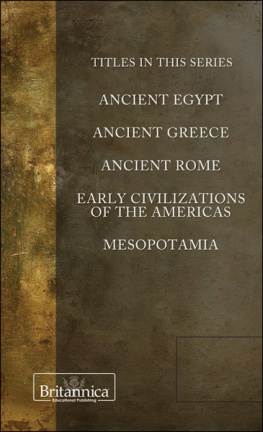JAMES L. PAPANDREA
THE MAIN CHARACTERS
StachysA Greek freedman, about forty-five years old. Formerly a slave in the household of Urbanus, he is now a client of Urbanus and a businessman. As a freedman of a Roman citizen, he has citizenship. Recently married to Maria (though they do not have a legally registered marriage), he is the stepfather of Marcus. He has a twelve-year-old son from a previous marriage, named Tertius, whose mother died in childbirth when Tertius was only a year old. About seven years after our story, Stachys will be greeted by the apostle Paul when he writes his letter to the Roman Christians, in Romans 16:9.
MariaA formerly wealthy Jewish widow from Jerusalem, who supported the ministry of Jesus and the apostles. After James was martyred, when Peter escaped from prison, she spent the last of her fortune smuggling Peter out of Jerusalem, bringing him to Rome in the year AD 42, along with her son, Marcus, and her servant, Rhoda. She married the widower Stachys just before the Jews were expelled from Rome by the Emperor Claudius, which meant that she and Rhoda could stay in Rome. Maria is known to the church as Mary of Jerusalem (Acts 12:12).
TertiusStachyss twelve-year-old son and Marias stepson. His mother died in childbirth when he was only a year old. When Tertius is older, he will work as a scribe for the apostle Paul and will take Pauls dictation for the letter to the Romans. He will take that opportunity to greet those of his home church in Romans 16:22.
MarcusMarias son and Stachyss stepson, he is twenty-eight years old. Cousin to the apostle Barnabas and associate of the apostle Paul, Marcus is also known as John Mark and was a traveling companion of Paul and Barnabas on their first missionary journey (Acts 15:37-39; Col 4:10; Philem 24). Marcus had returned to Rome to bring his mother out of the city following the edict of Claudius, but he arrived to find that his mother had married Stachys. Now he is leading the house church that meets in Stachyss home as well as leading the whole church of Rome as they await the return of the apostle Peter from the Jerusalem Council. He is also working on writing his Gospel.
UrbanusA wealthy Roman landowner and merchant of the equestrian class. He is the patron of his former slave Stachys. He is in his mid-fifties, and he is more than twenty years older than his wife. He and his wife, Sabina, have two daughters, Tryphaena and Tryphosa. He will be greeted by the apostle Paul when he writes his letter to the Roman Christians, in Romans 16:9.
SabinaThe wife of Urbanus, from a wealthy family of the senate class. Mother of Tryphaena and Tryphosa. She is about thirty years old.
RhodaA Jewish freedwoman, formerly a servant in the Jerusalem household of Maria (Acts 12:13). No one is sure exactly how old she is.
PhilologusA free, but poor, Roman. He does not have citizenship because he is a foreigner, from outside Italy. He is one of the deacons in the church of Rome and is in his late twenties. Philologus and Julia have five children: Prima, Olympas, twins Nereus and Nerea, and Anastasia. Philologus, Julia, and three of their children will be greeted by the apostle Paul when he writes his letter to the Roman Christians, in Romans 16:15.
JuliaPhilologuss common-law wife. She was married to Philologus at age twelve, though they do not have a registered marriage. She is nineteen years old and has five children, which is unusualnot that she had so many children in so short a time but that all five of them have survived. Julia, her husband, Philologus, and three of their children will be greeted by the apostle Paul when he writes his letter to the Roman Christians, in Romans 16:15.
ScrapAn eight-year-old slave boy in the household of the senator Titus Flavius Clemens the Elder. He will take his masters name when he is freed and will eventually be known to the church as Clement, bishop of Rome.
Clemens the YoungerThe son of Titus Flavius Clemens the Elder and a deacon in the church of Rome. He will later be called Clement when he is mentioned by Paul in Philippians 4:3.
PriscaThe daughter of Aquila and Priscilla. When they left Rome, she stayed behind to manage their awning shop. There was at one time a gathering of Jewish Christians who met in their shop, but that gathering is no longer meeting since the edict of Claudius banished Jews from Rome. The name Prisca is a shortened version of Priscilla, so references to Prisca in the letters of Paul are actually references to her mother, Priscilla.
PudensA senator of Rome who is a Christian. He is mentioned in 2 Timothy 4:21. According to tradition, the apostle Peter made Pudenss home the headquarters for his ministry in Rome. Pudens has two daughters, Pudenziana and Prassede.
Lucius GetaPrefect of the Praetorian Guard, which is the elite bodyguard of the emperor. The praetorians were very powerful in Rome. They had organized the assassination of the previous emperor, Caligula, and had put the present emperor, Claudius, on the throne. As prefect, Geta would have the ear of the emperor.
NarcissusOne of the emperor Claudiuss most trusted freedmen. He was the emperors personal secretary, which meant that he had the power to grant favors and even advise the emperor on important appointments. He had Claudiuss third wife killed so that Agrippina, the mother of Nero, could take her place. Some of the slaves in Narcissuss household were Christians.
Linus (Aquilinus)A leader or shepherd of one of the house churches in Rome. He presides over worship in a butchers apartment. After Peters martyrdom, Linus will become Peters first successor as the leader of the church in Rome. He will serve as bishop of Rome from the death of Peter until AD 76.
Cletus (Anacletus)Another shepherd of one of the house churches in Rome, he presides over the liturgy in the home of senator Pudens. He will succeed Linus as bishop of Rome from AD 76 to 88.
ApellesThe shepherd of the house church that meets in his own apartment in Trans-Tiber, the poor neighborhood across the river. He will be greeted by the apostle Paul when he writes his letter to the Roman Christians, in Romans 16:10.















